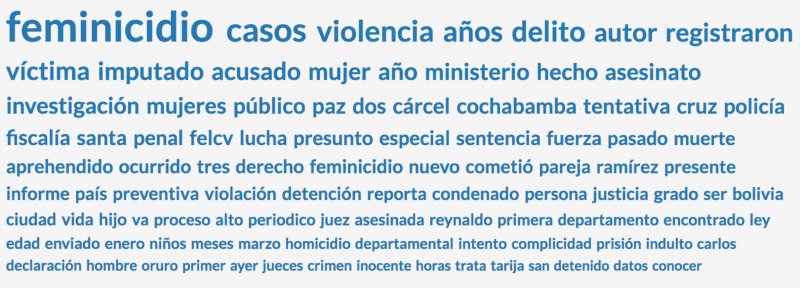
The Reframed Stories Project asks people to respond to dominant themes and issues that appear in news coverage about their communities. These stories are reflections by people who are frequently represented by others in the media. Word clouds are created using the Media Cloud platform, a data analysis tool which examines a collection of media outlets over a specific period of time, allowing participants to analyze and discuss the preliminary insights into how they might be represented in the media. The project refrains from making conclusive pronouncements about the data, and instead is a starting point that creates space for discussion about how they can help shape their own media representation through digital media.
Silvia Mena Sánchez is a researcher in Cochabamba, Bolivia and participates in the of “Cuántas más?” (How many more?) platform that compiles data and maps cases of feminicide in Bolivia. The following is Silvia's analysis of the word cloud for the term “feminicidio” (feminicide).

Dominant words from 1,540 articles published between May 2017 and May 2018 mentioning “feminicidio” within 2 Media Cloud collections of Bolivia’s Spanish-language media outlets. (view larger image)
Yo creo que el feminicidio en Bolivia carece de justicia y que muchas condenas liberan y dejan impunes a feminicidas todos los días. La poca celeridad en la investigación y sentencias de los casos evidencian la ausencia de la voluntad estatal para trabajar en la perspectiva de género, la educación y la prevención sobre los derechos de las mujeres.
Urge incorporar presupuesto para generar mecanismos de atención inmediata a las víctimas que sufren violencia sistemática cuyo desenlace es la muerte de bolivianas.
Los riesgos de la violencia contra las mujeres y el feminicidio legitiman en muchos casos el machismo y estigmas sobre las mujeres en la sociedad.
Busquemos igualdad, autonomía y respeto cuando digamos ¡NO!
Feminicide in Bolivia lacks justice. Many sentences [lead to] release and leave many feminicides to go unpunished every day. The slowness in the investigation and judgments of the cases demonstrate the absence of the State's willingness to work for gender, education and prevention that would benefit women's rights.
It is urgent to incorporate funding to create mechanisms to provide immediate attention to victims who suffer systematic violence that lead to the death of Bolivian women.
In many cases, the risks of violence against women and feminicide legitimize machismo and stigmas about women in society.
Let's look for equality, autonomy and respect when we say NO!
This is part of a Rising Frames series developed as part of an activity organized by Raisa Valda Ampuero of Warmi.Red and Fabiola Chambi. They helped organize a workshop held on May 30, 2018 in Cochabamba, Bolivia that brought together representatives from various collectives and groups to examine how they or issues they care about are represented in a Bolivia media collection and created stories in response to that representation.
Support our work
Since Rising Voices launched in 2007, we’ve supported nearly 100 underrepresented communities through training, mentoring, microgrants and connections with peer networks. Our support has helped these groups develop bottom-up approaches to using technology and the internet to meet their needs and enhance their lives.
Please consider making a donation to help us continue this work.



